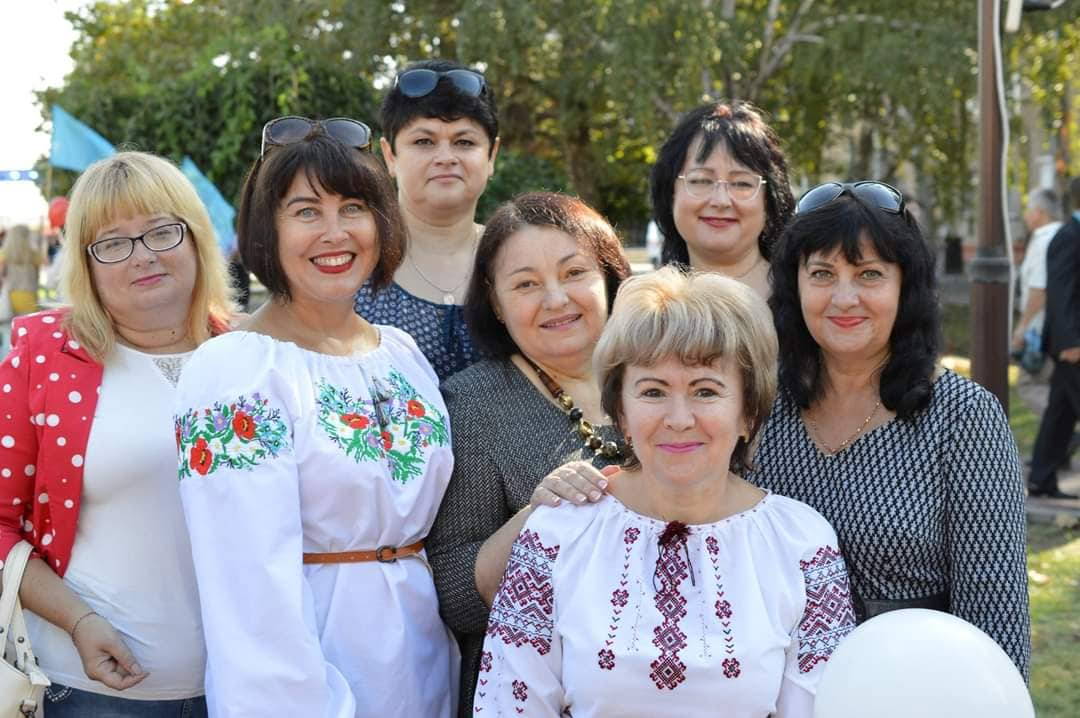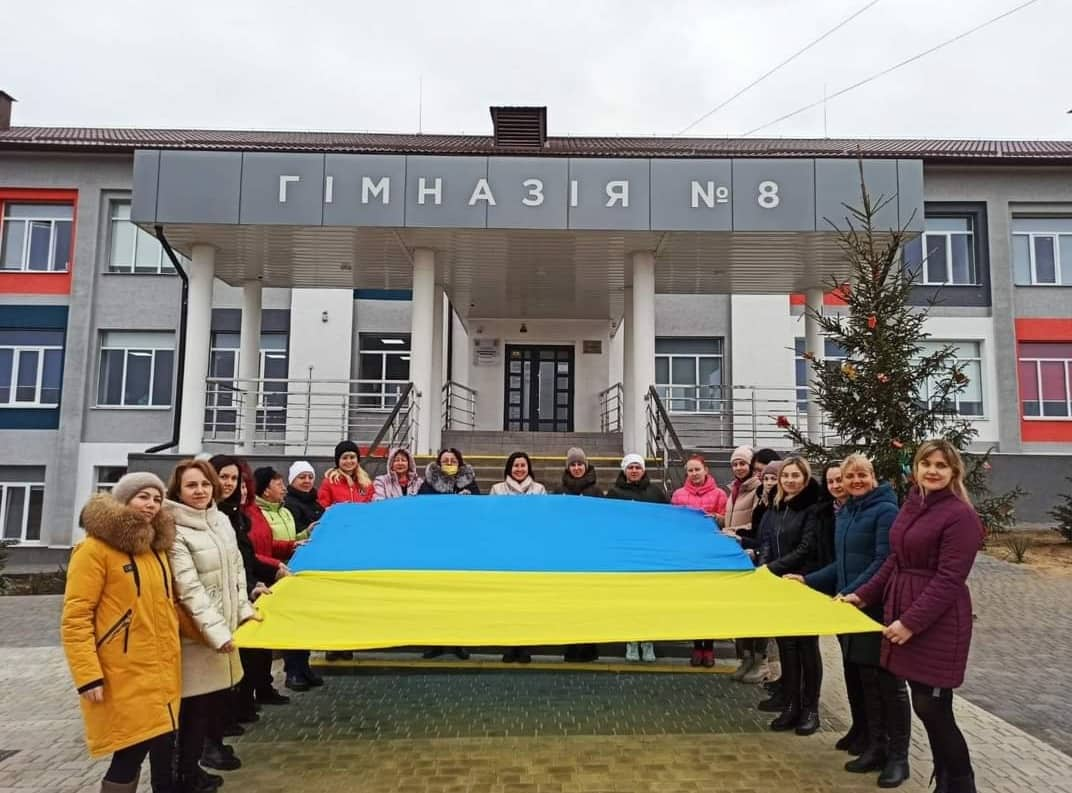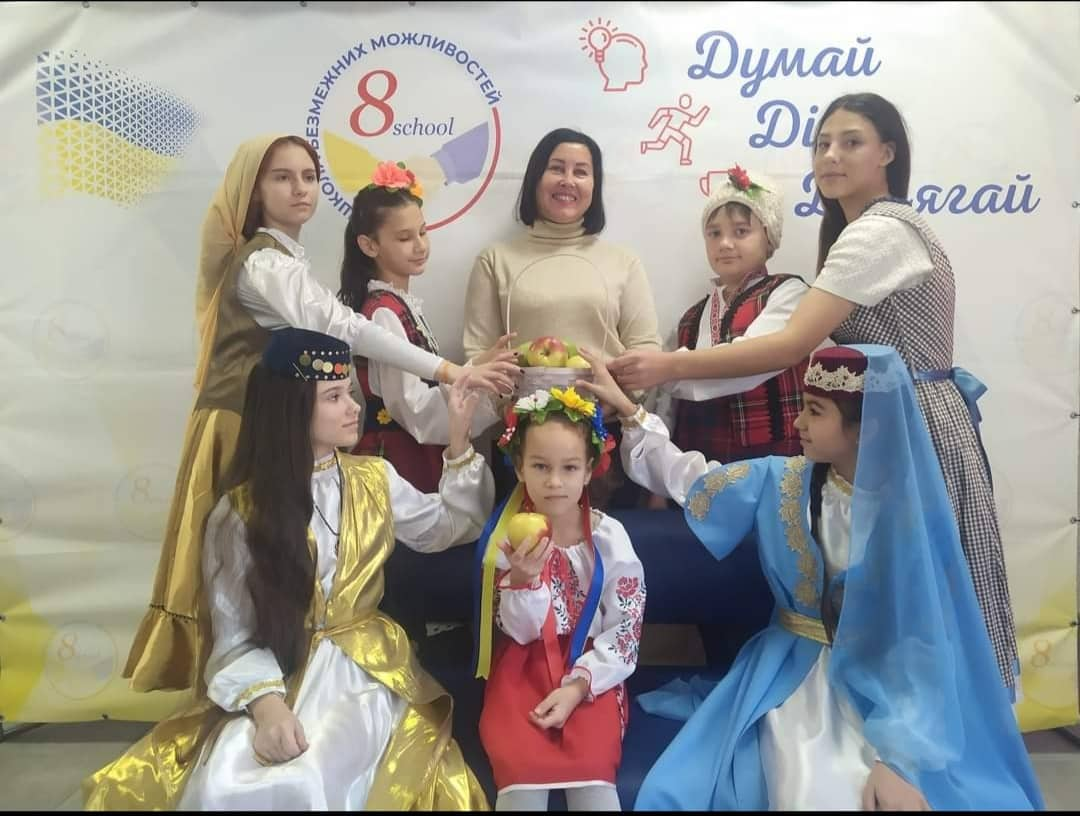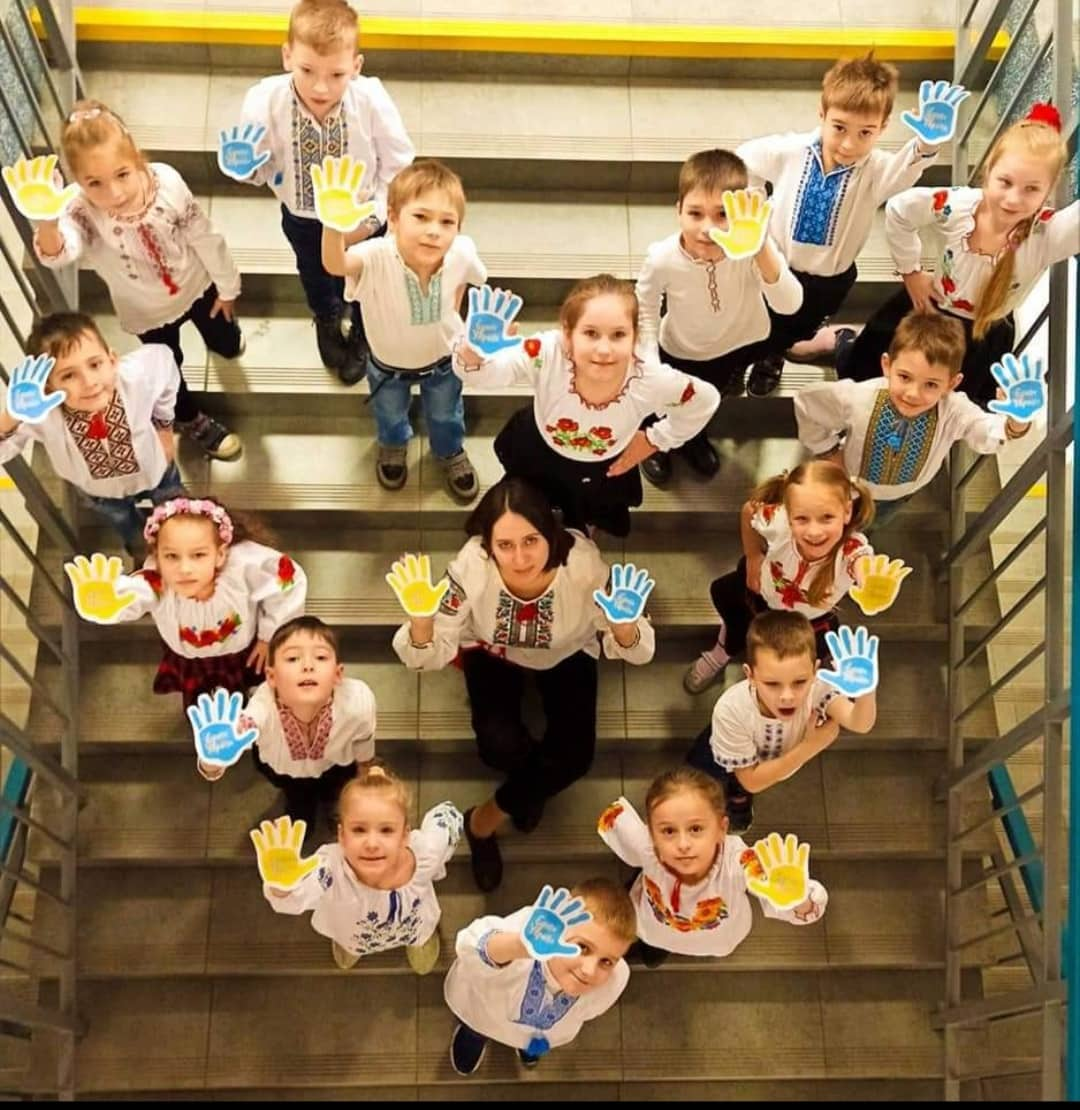Interview 3. Melitopol is Ukraine. Olena Zameniahre
Olena Zameniahre, the director of Melitopol gymnasium No. 8, tells about the horrors of the occupation and that human life matters most.
In the occupied Melitopol, the educational situation is extremely difficult. Since the beginning of the russian aggression, educational institutions were not functioning, and now the occupants incline local teachers to collaboration. According to the Ukrainian Ombudsman, schoolchildren are forced to wear Ribbons of Saint George, study poems about the war and participate in the shooting of propaganda videos.
Olena Zameniahre, the director of Melitopol Gymnasium No. 8, who stayed in the occupied city until March 24, tells about how Melitopolians survive, but do not surrender to the russian occupation.

The main lesson
The first lesson is that you can’t surrender. In Melitopol, it was difficult because already on February 25, the city was practically occupied. It happened really quickly. From those early days, we were in despair, no one in our team knewwhat to do, what would happen next. But we must believe – first of all, in those people around. Communicating with each other, we understood that things were not so bad and that we could do something under such circumstances as well and be useful.
The second lesson is to believe in your own abilities. Do not think that nothing depends on you. That’s not true. My colleagues needed me as a decision maker, so we stayed in touch with our parents despite the difficulties. For a week or two, our public transport was not functioning, so not everyone could come to school. For some time, we had no connection, and we could not hear from each other at all. We were in a bubble: they can’t hear you – and you can’t hear anyone. But from the information that reached us, we knew that there was resistance, that Ukrainians did their best to counter the invaders. And it gave us strength and support.


Unfortunately, we have not yet learned all the lessons, we have not survived everything.

Don’t “liberate” us
At the beginning of the war, people still felt free and could not believe that we could be occupied. So we went to rallies for Ukraine, where I saw a lot of school principals and teachers. I was glad that we kept in step. I thought if I went to the rally, people would see me there – parents, pupils, then I could say that I was an example for them, and they were an example for me. It was nice to see kindred faces, kindred eyes.
Once there was a rally near the district state administration, there were bags of sand, and behind them the occupants with weapons. At first, they just sat there, and then they started coming up to us and saying, “We’ve come to liberate you. Why are you being so aggressive?” But we don’t know what they were “liberating” us from. There were also certain areas that we could not enter, and when people approached these areas, the occupants ran up to them with electric shockers and shouted that they should not come in. The rallies lasted about a week, and then people were encircled and those who were at the head were taken away. They detained these people in cellars for weeks.
Everyday heroism
I can’t say we’re heroes. But we tried to do at least something in our city and school. For example, we arranged a tour of duty, parents and teachers were on duty. The school had an alarm system, but we were warned that during the war, even if it was activated, no one would come. There were patrols in the city for a while, but it wasn’t long. The occupants liquidated it.
We were collecting aid, because people, in particular from Mariupol, evacuated to us. We collected hygiene products, medicines, underwear. We didn’t post it on social media because it was dangerous. The occupants could come to school and take everything. That’s what happened in some schools.
Melitopolians have been living in occupation for three months, some of them have very difficult conditions. People hold on, believe, hope, do very much even under the circumstances when it is very problematic to help.


Everything was taken out from some schools. One institution was under renovation, and even tiles were takenaway from there.

Looting in education
My colleagues are forced to collaborate. The occupation authorities held a gathering where ten teachers came. They were offered a job, two teachers agreed. Therefore, the occupants decided that our gymnasium No. 8 would not function, and the neighbouring school would open. But I believe we must not cooperate with the occupants, it’s a sin.
Among my colleagues there are my kindred spirits who will never accept these proposals. We communicate with them very often. They keep being on watch, cleaning the yard. We planted a lot of roses in autumn, and they care of them. I see colleagues are deeply worried about the school.
The occupation authorities are taking inventory of the schools, and the teachers who took the equipment home were forced to return it. Soldiers came with guns to some teachers’ homes, they broke the doors open, and, no wonder, people gave the equipment away. Our authorities warned us not to expose people to danger, because human life is above all else. You can buy equipment again, rebuild everything, but life is not replaceable.
Everything was taken out from some schools. One institution was under renovation, and even tiles were taken away from there. We are very worried that this can happen in our school too, as we have new equipment and furniture. If that happens, it will be a pain.
Educational front
In order not to obey the occupants, the directors of Melitopol schools are forced to resign at their own request. There are also cases of kidnapping of educators as they refuse to work according to russian “standards”. Our children who could continue their studies remotely do not have such a possibility – in Melitopol, there are frequent outages with the Internet and mobile connection.

To help Ukrainian educators continue to teach children during the war, the EdCamp Ukraine community launched a crowdfunding campaign — fundraising for computer equipment and Internet access for those teachers who lost their teaching equipment because of the war. Also, the funds raised are planned to be used for psychological support of teachers and organization of conferences, where they can share their experience of teaching during the war. Both citizens from abroad on the GoFundMe platform and Ukrainians can join the campaign on the EdCamp Ukraine page, by adding a comment “My War. Lessons” to the payment.
No learning
Since February 24, we completely terminated the educational process. And since May 2, by the decision of the Zaporizhia Oblast State Administration, the academic year officially ended. Unfortunately, we could not study either offline or online due to a very bad internet connection, network damages. There was no connection at all during the first two weeks. The only thing that works is the group of our gymnasium on Facebook. There, I posted all lessons, learning materials for those children who may have left and can use them. It happens that children in Melitopol can catch a signal and study on their own.

The schoolchildren are very concerned today, because our school only teaches up to the ninth grade. Children now have to obtain certificates and submit documents to other educational institutions. They can’t do that, education is in question, and people are waiting. Most of the children remained in the city, of course, they are worried about how to continue their studies. Obtaining documents on education is a big issue. This mechanism has not been worked out, we cannot bring documents to the occupied territory. This problem is being addressed at various levels, including the President of Ukraine.


We have a very nice modern school, with everything for children’s self-realization. But now our children are deprived of the simplest options – to study, to play during the breaks, to do lessons.

Sad holidays
The challenge for our community is one: occupation. When we told our kids about the occupation, I never thought I’d have to go through it in person. And we were faced with this terrible phenomenon. In the unoccupied territories of Ukraine, principals still work in schools, children learn waltz, prepare for graduation party. In our school there were always bright graduation parties, a lot of people came to us, we made a beautiful flower arch and put chairs. We’ve always had great family holidays. But our children and community are now deprived of it. Everything was cancelled by the war.
We have always called ourselves the School of Infinite Opportunities. We have a very nice modern school, with everything for children’s self-realization. But now our children are deprived of the simplest options – to study, to play during the breaks, to do lessons.
Psychological support agents
In preparation for the EdCamp (un)conference in Melitopol, we had the idea: we wanted to imagine that we were agents 008 and explore how the social and emotional learning program affects the educational process and development of children. If we held the event today, I think we would utilize the idea of agents. But we would not only talk about SEE Learning, although nowadays we often use the practices to calm down.
We would talk about what supported us, what we were strong in, and what we were weak in. Even before captivity, our mayor Ivan Fedorov said that we saw our gaps then: where we had been not so insistent, where we had lacked patriotism. We would talk about our strengths and weaknesses, about what we’d do and what we’d change in a new free Ukraine.
Let’s meet in Kharkiv
I would go to a place where teachers could get together, as it used to be in Kharkiv. Now I have the crazy support of all my friends on EdCamp. When I published an article about the occupation, many people wrote to me in support. I honestly say that I am no longer in Melitopol, and have not yet heard condemnation from anyone, only support. Now Dniprorudne is occupied, and from there, school principals write to me about how to organize the learning process in occupation, how to establish communications. Today I see a lot of support online, and I would like to meet live and thank my colleagues.


We could show by example what we have been through in occupation and share experiences of survival, faith, and unity.

Hard experience
I think most of our children need psychological support. Because we had explosions in Melitopol, houses were destroyed. We know families that lost relatives who died on the front. Maybe we can pass on the experience of personal resilience. We could help people with war-related injuries.
We could show by example what we have been through in occupation and share experiences of survival, faith, and unity. I call a lot of people, and everyone says that they hold on, that they believe in our victory and liberation. Yes, there are many problems, but they are ready to endure and even get used to something, but only with faith for liberation.
Nowadays we are scattered in different cities and cannot communicate. In Melitopol, for example, people delete all messages in Telegram after communicating. That’s why it’s really complicated. We have some experience, but we don’t have the opportunity to share it yet.
Soul of the people
I am a teacher of Ukrainian literature. We always learned a lot of songs in our classes, and at the beginning of the year we traditionally had song lessons. My children and I learned the anthem of Ukrainian Sich Riflemen, analyzed metaphors, images, but it did not arouse much understanding in children before. Nowadays, during the war, we heard this song in a new fresh sound. And it seems to me that these words have been heard anew and acquired a new meaning. I always tell children that the song is the soul of the people. I think now we are absolutely sure that we will win.
Text – Halyna Kovalchuk.
The interview series My War. The Lessons was prepared with financial support from the Black Sea Trust for Regional Cooperation – a project of the German Marshall Fund of the United States.
The views and opinions expressed are those of the author and do not necessarily reflect the official policy or position of EdCamp Ukraine and the Foundation.








